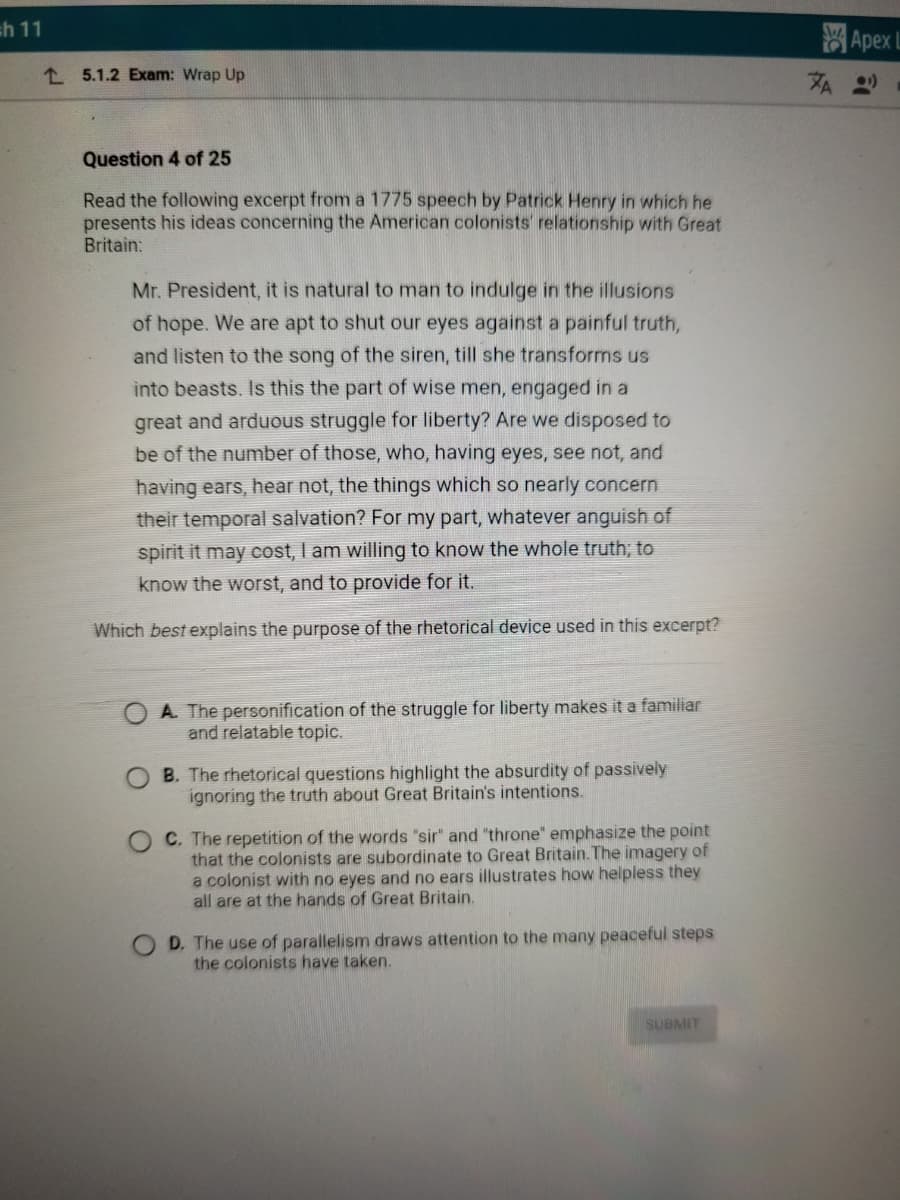Read the following excerpt from a 1775 speech by Patrick Henry in which he presents his ideas concerning the American colonists' relationship with Great Britain: Mr. President, it is natural to man to indulge in the illusions of hope. We are apt to shut our eyes against a painful truth, and listen to the song of the siren, till she transforms us into beasts. Is this the part of wise men, engaged in a great and arduous struggle for liberty? Are we disposed to be of the number of those, who, having eyes, see not, and having ears, hear not, the things which so nearly concern their temporal salvation? For my part, whatever anguish of spirit it may cost, I am willing to know the whole truth; to know the worst, and to provide for it. Which best explains the purpose of the rhetorical device used in this excerpt? A. The personification of the struggle for liberty makes it a familiar and relatable topic. B. The rhetorical questions highlight the absurdity of passively ignoring the truth about Great Britain's intentions. O C. The repetition of the words "sir" and "throne" emphasize the point that the colonists are subordinate to Great Britain. The imagery of a colonist with no eyes and no ears illustrates how helpless they all are at the hands of Great Britain. O D. The use of parallelism draws attention to the many peaceful steps the colonists have taken.
Read the following excerpt from a 1775 speech by Patrick Henry in which he presents his ideas concerning the American colonists' relationship with Great Britain: Mr. President, it is natural to man to indulge in the illusions of hope. We are apt to shut our eyes against a painful truth, and listen to the song of the siren, till she transforms us into beasts. Is this the part of wise men, engaged in a great and arduous struggle for liberty? Are we disposed to be of the number of those, who, having eyes, see not, and having ears, hear not, the things which so nearly concern their temporal salvation? For my part, whatever anguish of spirit it may cost, I am willing to know the whole truth; to know the worst, and to provide for it. Which best explains the purpose of the rhetorical device used in this excerpt? A. The personification of the struggle for liberty makes it a familiar and relatable topic. B. The rhetorical questions highlight the absurdity of passively ignoring the truth about Great Britain's intentions. O C. The repetition of the words "sir" and "throne" emphasize the point that the colonists are subordinate to Great Britain. The imagery of a colonist with no eyes and no ears illustrates how helpless they all are at the hands of Great Britain. O D. The use of parallelism draws attention to the many peaceful steps the colonists have taken.
Related questions
Question

Transcribed Image Text:ch 11
Apex L
1 5.1.2 Exam: Wrap Up
A 2)
Question 4 of 25
Read the following excerpt from a 1775 speech by Patrick Henry in which he
presents his ideas concerning the American colonists' relationship with Great
Britain:
Mr. President, it is natural to man to indulge in the illusions
of hope. We are apt to shut our eyes against a painful truth,
and listen to the song of the siren, till she transforms us
into beasts. Is this the part of wise men, engaged in a
great and arduous struggle for liberty? Are we disposed to
be of the number of those, who, having eyes, see not, and
having ears, hear not, the things which so nearly concern
their temporal salvation? For my part, whatever anguish of
spirit it may cost, I am willing to know the whole truth; to
know the worst, and to provide for it.
Which best explains the purpose of the rhetorical device used in this excerpt?
A. The personification of the struggle for liberty makes it a familiar
and relatable topic.
B. The rhetorical questions highlight the absurdity of passively
ignoring the truth about Great Britain's intentions.
O C. The repetition of the words "sir" and "throne" emphasize the point
that the colonists are subordinate to Great Britain. The imagery of
a colonist with no eyes and no ears illustrates how helpless they
all are at the hands of Great Britain.
D. The use of parallelism draws attention to the many peaceful steps
the colonists have taken.
SUBMIT
Expert Solution
This question has been solved!
Explore an expertly crafted, step-by-step solution for a thorough understanding of key concepts.
This is a popular solution!
Trending now
This is a popular solution!
Step by step
Solved in 3 steps
